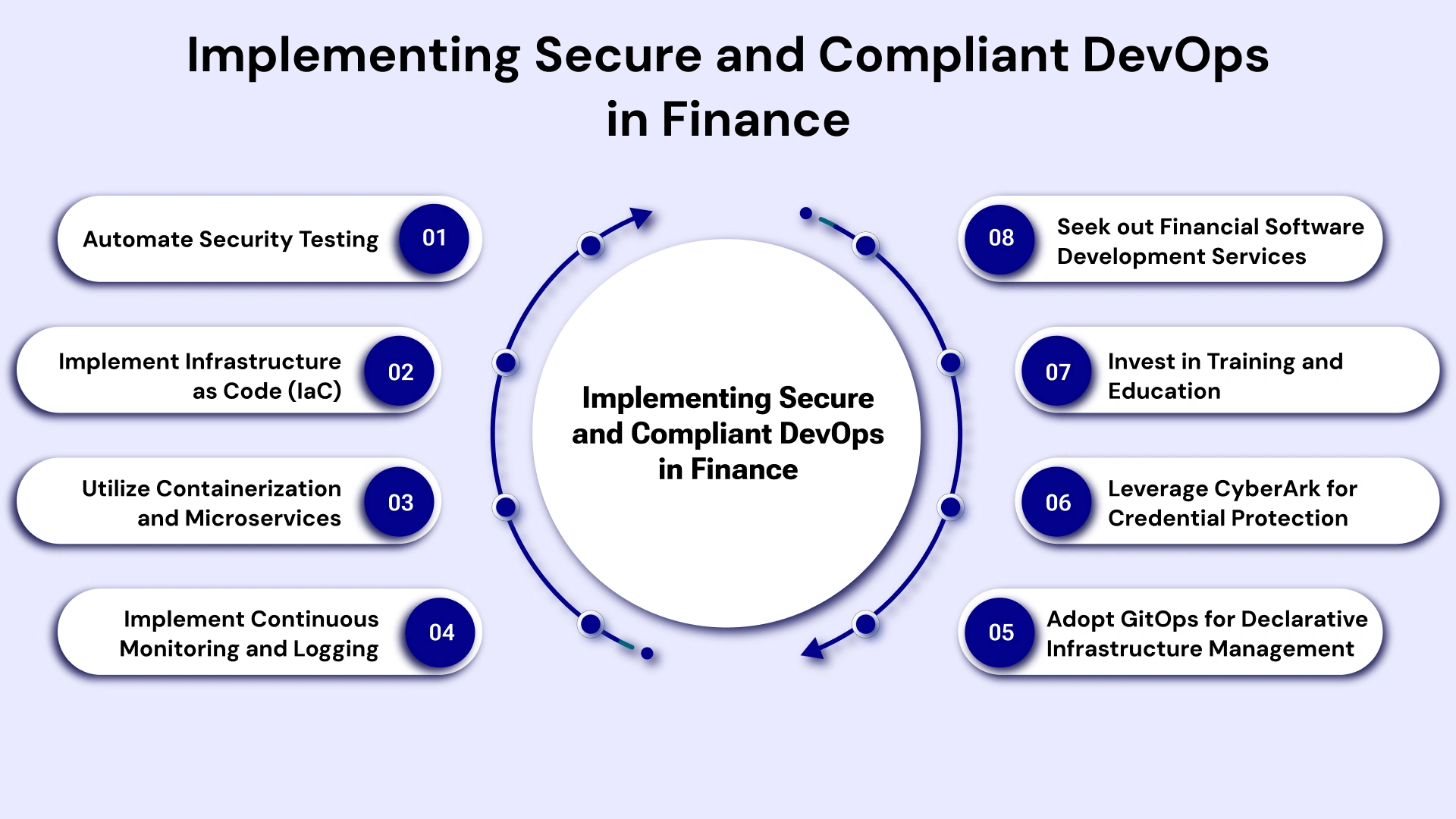The financial services industry, a cornerstone of global economic stability, is undergoing a transformative digital evolution. Driven by the imperative for enhanced agility, relentless innovation, and unyielding security, institutions are increasingly embracing DevOps practices.
The statistics paint a compelling picture: over 80% of financial services firms have integrated various banking and DevOps methodologies, signifying a widespread recognition of the benefits of streamlined development and operational processes.

This blog delves into the profound impact of DevOps on security and compliance within financial services. It explores the essential role of DevOps in modern businesses, its specific advantages to the financial sector, the challenges encountered, and the strategies for successful implementation.
Why DevOps Is Essential for Modern Business
In today's dynamic and hyper-competitive digital landscape, businesses must adapt to market fluctuations. DevOps consulting services, emphasizing collaboration, automation, and continuous improvement, provide the framework for achieving this.
By dismantling silos between development and operations teams, DevOps accelerates the software development lifecycle, reduces time-to-market, and enhances product quality. This is particularly crucial in the financial sector, where rapid innovation, seamless customer experiences, and unwavering security are paramount.
Accelerated Development Cycles:
DevOps enables continuous integration and continuous delivery (CI/CD), allowing for faster iteration and deployment of software updates. This agility is vital for financial institutions to respond swiftly to evolving market conditions, regulatory changes, and customer expectations. Organizations can deliver new features and updates more frequently by automating builds, tests, and deployments, gaining a competitive edge.
Enhanced Collaboration and Communication:
DevOps fosters a culture of collaboration and transparency, breaking down traditional silos between development and operations teams. This improved communication leads to better alignment, faster problem-solving, and increased efficiency. Shared responsibility and mutual understanding among team members are crucial for navigating the complexities of financial software development.
Improved Software Quality and Reliability:
Continuous testing and feedback loops integrated into DevOps practices ensure that software is thoroughly tested and reliable, reducing the risk of errors and downtime. Automated testing, including unit testing, integration testing, and security testing, allows for early detection and resolution of issues, minimizing customer impact.
Increased Innovation and Time-to-Market:
By streamlining development processes, DevOps enables financial institutions to market new products and services faster, gaining a competitive edge. This agility allows organizations to capitalize on emerging market opportunities and meet their customers' evolving needs.
Cost Optimization:
Automation and efficient resource utilization reduce operational overhead, leading to significant cost savings. Organizations can reduce operational costs and allocate resources more strategically by automating manual tasks and optimizing infrastructure usage.
Benefits of DevOps in Financial Services
The financial services industry stands to gain significantly from DevOps Adoption in finance. Here are some key benefits:

Increased Agility and Speed:
DevOps enables faster development cycles and quicker deployment of new features and updates, allowing financial institutions to respond rapidly to market demands and customer needs. This is critical for staying ahead in a rapidly evolving market where customer expectations constantly change.
Enhanced Security and Compliance:
Implementing DevSecOps in Finance integrates security into every development lifecycle stage, reducing vulnerabilities and ensuring adherence to stringent regulatory requirements. This proactive approach minimizes the risk of security breaches and compliance violations, which can have severe consequences for financial institutions.
Improved Collaboration and Communication:
DevOps fosters collaboration between development and operations teams, leading to better alignment and faster problem-solving. This enhanced communication is essential for navigating the complexities of the financial sector, where multiple teams and stakeholders are involved in software development and deployment.
Reduced Operational Costs:
Automation and streamlined processes reduce manual errors and operational overhead, resulting in cost savings. This efficiency allows financial institutions to allocate resources strategically, investing in innovation and customer service.
Enhanced Customer Experience:
Faster deployment of new features and improved reliability lead to a better customer experience, fostering loyalty and trust. This is crucial for maintaining customer confidence in the digital age, where customers expect seamless and secure digital experiences.
Modernizing:
Mainframe and monolithic systems in DevOps are becoming increasingly critical for legacy institutions trying to remain competitive. Modernizing these systems allows for greater agility, scalability, and security, enabling organizations to adapt to changing market conditions and customer needs.
Note: Financial software development services implementing DevOps methodologies have become extremely valuable for financial institutions. These services provide the expertise and resources to implement and manage DevOps practices, ensuring successful adoption and maximizing benefits.
DevOps Challenges in Financial Services
Despite the numerous benefits, implementing DevOps in financial services presents unique challenges:

Stringent Regulatory Requirements:
The financial industry is subject to strict regulations, such as GDPR, PCI DSS, and SOX, which require meticulous compliance measures. GDPR compliance in CI/CD workflows requires careful planning and implementation to ensure data privacy and security throughout the development lifecycle. This includes implementing data encryption, access controls, and audit trails.
Legacy Systems:
Many financial institutions rely on legacy systems that are difficult to integrate with modern DevOps tools and practices. These systems often lack the flexibility and scalability required for modern development workflows, hindering the adoption of DevOps practices.
Security Concerns:
The sensitive nature of financial data necessitates robust security measures, making security a top priority. Data breaches can have severe consequences, including financial losses, reputational damage, and regulatory penalties. Implementing robust security controls and practices is essential for protecting sensitive data.
Cultural Resistance:
Traditional financial institutions can find it challenging to overcome resistance to change and foster a collaborative culture. This requires strong leadership and a commitment to cultural transformation, promoting collaboration, transparency, and continuous improvement.
Talent Gap:
Finding skilled DevOps professionals with expertise in financial services can be difficult. The industry requires professionals with a deep understanding of technology and financial regulations. Devops consulting services can help bridge this gap by providing expert guidance and support, enabling organizations to build and manage effective DevOps teams.
Data governance:
Implementing proper data governance strategies is crucial to ensuring data integrity, security, and compliance. This includes establishing data quality standards, implementing data access controls, and ensuring compliance with regulatory requirements.
DevOps: A Paradigm Shift for Security and Compliance
DevOps represents a paradigm shift for security and compliance in financial services. By integrating security into the development lifecycle, institutions can proactively address vulnerabilities and ensure compliance with regulatory requirements. Implementing DevSecOps means building security into every process phase, from planning and development to testing and deployment.
The benefits of implementing DevOps for security and compliance are significant:
- Reduced Security Breaches: Integrating security into the development lifecycle reduces the risk of vulnerabilities and security breaches. This proactive approach minimizes the impact of potential security incidents.
- Improved Compliance: Automation and continuous monitoring ensure adherence to regulatory requirements, reducing the risk of penalties. This is crucial for maintaining compliance with stringent financial regulations.
- Faster Incident Response: Rapid detection and response to security incidents minimize the impact of breaches, allowing financial institutions to contain and mitigate the effects of security incidents quickly.
- Enhanced Auditability: Comprehensive logging and monitoring provide a clear audit trail, facilitating compliance audits. This transparency enhances accountability and demonstrates adherence to regulatory requirements.
- Increased Trust and Confidence: Robust security and compliance measures enhance customer trust and confidence in the institution. This is crucial for maintaining customer loyalty and building a strong reputation.
Implementing DevOps for Security and Compliance in Financial Services
Successful implementation of DevOps for security and compliance requires a strategic approach. Here are some key steps:

Automate Security Testing:
Integrate security testing into the CI/CD pipeline to identify and address vulnerabilities early in development. Tools for security automation, including static application security testing (SAST), dynamic application security testing (DAST), and software composition analysis (SCA), are essential for this.
Implement Infrastructure as Code (IaC):
IaC enables infrastructure management through code, ensuring consistency and compliance. Infrastructure as Code in Finance helps create a secure and compliant environment by automating infrastructure provisioning and configuration.
Utilize Containerization and Microservices:
Containerization and microservices improve scalability, resilience, and security by isolating applications and reducing the attack surface. This modular approach allows for faster updates and more effortless security patching.
Implement Continuous Monitoring and Logging:
Continuous monitoring and logging provide real-time insights into system performance and security, enabling rapid detection and response to threats. This proactive approach minimizes the impact of security incidents.
Adopt GitOps for Declarative Infrastructure Management:
GitOps for declarative infrastructure management in fintech helps ensure the infrastructure state is always consistent with the declared configuration. This approach enhances security and compliance by providing a clear audit trail of changes.
Leverage CyberArk for Credential Protection:
Protecting sensitive credentials is crucial. CyberArk for credential protection provides robust security for privileged access management, minimizing the risk of unauthorized access.
Invest in Training and Education:
Provide comprehensive training and education to development and operations teams on DevOps practices and security best practices. This ensures all team members have the knowledge and skills to implement and maintain a secure and compliant DevOps environment.
Seek out Financial Software Development Services:
Partnering with experienced financial software development services providers can provide the necessary expertise and resources. These providers can help financial institutions navigate the complexities of DevOps implementation and ensure compliance with industry regulations.
PRO TIPS:- Case studies of banks using DevOps can provide valuable insights and best practices. Learning from the experiences of other institutions can help avoid common pitfalls and accelerate the adoption of DevOps.
Future of DevOps in Financial Services
The future of DevOps in Financial Services is bright, with several emerging trends shaping the industry:
- AI and Machine Learning: AI/ML in DevOps and AI and ML in the fintech industry are transforming DevOps by automating tasks, improving security, and enhancing performance. AI-powered security tools can detect and respond to threats in real-time.
- Cloud-Native Development: Cloud-native development is becoming increasingly popular, enabling financial institutions to leverage the scalability, flexibility, and cost-effectiveness of cloud platforms.
- Serverless Computing: Serverless computing simplifies infrastructure management and reduces operational overhead, allowing developers to focus on building applications. This can lead to faster development cycles and reduced costs.
- DevSecOps Automation: Increased automation of security processes will become essential in keeping pace with the increasing rate of software delivery. This includes automating security testing, compliance checks, and incident response.
Trends of devops in finance show an increasing interest in leveraging data analytics to improve operational efficiency. This includes using data to optimize resource allocation, identify bottlenecks, and improve performance. Devops development services must adapt to these new trends and offer specialized expertise in AI/ML, cloud-native development, and serverless computing.
Maximize Security, Minimize Risk: VLink DevOps for Financial Services
Safeguarding sensitive data and ensuring regulatory compliance are paramount in the high-stakes realm of financial services. VLink DevOps for financial services offers a robust strategy to maximize security while minimizing risk.
By integrating security automation (DevSecOps) from the outset, VLink DevOps engineers ensure vulnerabilities are proactively addressed, leveraging tools for security automation and automating GDPR compliance within CI/CD workflows. This approach, coupled with Infrastructure as Code (IaC) security hardening and continuous monitoring, provides a fortified environment crucial for financial institutions navigating stringent regulatory landscapes.
VLink's dedicated team solutions prioritize secure credential management through CyberArk integration and implement comprehensive risk mitigation strategies, including disaster recovery and business continuity planning. This holistic approach enhances security posture, improves compliance, accelerates time-to-market, and reduces operational costs.
By partnering with VLink, financial institutions can leverage expert DevOps practices, bolstering customer trust and ensuring a secure, compliant, and innovative digital environment.
Conclusion
DevOps has emerged as a critical enabler of security and compliance in the financial services industry. By fostering collaboration, automating processes, and integrating security into the development lifecycle, financial institutions can enhance agility, reduce risk, and improve customer experience. As the industry evolves, DevOps will be increasingly vital in driving innovation and ensuring compliance.
By embracing DevOps practices and leveraging emerging technologies like AI/ML, financial institutions can navigate the challenges of the digital age and thrive in the competitive global market. Startup owners and CXOs looking to implement effective DevOps strategies for enhanced security and compliance or to discuss their specific needs should contact us today for a consultation.










 Shivisha Patel
Shivisha Patel

















